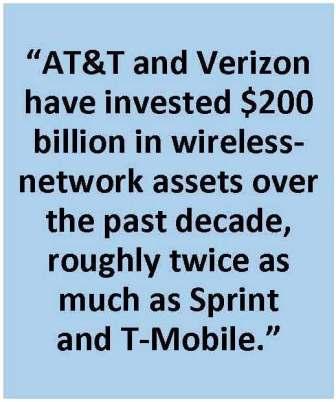
NEW YORK – The wireless industry continues to be one of the most difficult markets to break into and according to a just released report from Moody’s Investors Service in the U.S. A&T and Verizon Wireless hold a commanding lead in the American market, that the ratings service predicts will only widen.
"AT&T Mobility and Verizon Wireless have better network coverage, wider capabilities and wider profit margins which gives them a competitive advantage that smaller rivals just can't match," said Mark Stodden, a Moody's analyst and author of the report. "It is too late for competitors to invest and catch up; Sprint has the willingness but not the ability, while T-Mobile's parent Deutsche Telekom, is the opposite."
Moody's estimates that AT&T and Verizon represented 81% of 2011 industry EBITDA, and expects this share to remain around 80% through 2015.
Harris Rubinroit, a Moody’s analyst, points to the massive investment AT&T and Verizon have made in their wireless networks as a prime reason for their market advantage. “AT&T and Verizon have invested $200 billion in wireless-network assets over the past decade, roughly twice as much as Sprint and T-Mobile. Meantime, AT&T and Verizon will generate more cash than their rivals to invest in their wireless networks, widening the competitive moat.”
A widely published rumour is that Apple’s new iPad 3, due to be announced next month, will have 4G capability, so AT&T and Verizon Wireless can further exploit their competitive advantage by having it run on their 4G networks.

Rubinroit adds that smaller carriers are also having a tough time attracting investors to compete. AT&T and Verizon he claims are the only two companies in the U.S. wireless industry that will earn enough to cover their cost of capital. “Sprint and T-Mobile generate weak profits, which will mean a higher cost of capital as investors grow tired of subpar returns. Investors are already walking away, making it harder for the carriers to attract capital to keep pace.”
(Ed note: Does any of this sound familiar to those working in wireless in Canada?)
While consolidation could ease the pressure on smaller rivals he cautions that if a deal between Sprint and T-Mobile were to happen it would entail “immense financial and execution risk.” And even still, regulators would deny such a merger adds Rubinroit. “It is more likely that Sprint will look to step up its presence in the prepaid niche by buying MetroPCS Wireless Inc. and Leap Wireless International Inc., but this would not meaningfully improve its competitive position.”
Moody's contends that regulatory issues remain a key concern for the industry, given the Federal Communications Commission (FCC) and Justice Department's (DoJ) comments around the failed AT&T/T-Mobile merger last year. “From these comments, it's clear that the FCC and DoJ consider that a minimum of four national carriers is essential for consumer choice and competition,” says Moody’s.



